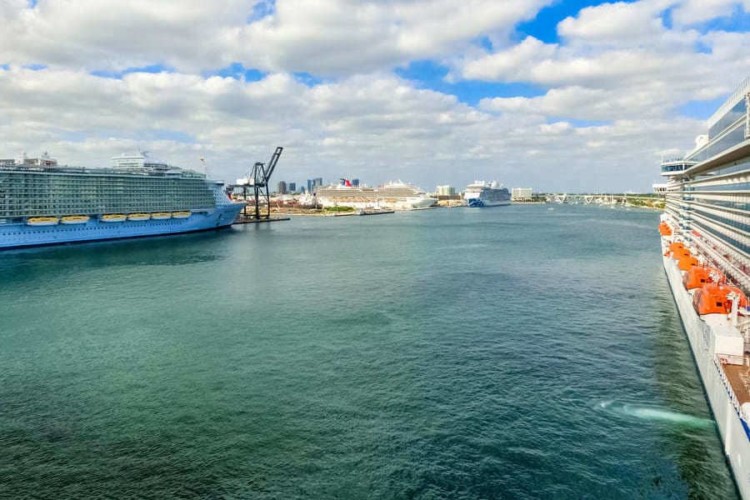
Many major cruise line companies are operating in spite of cruise ship warnings by the State Department. The travel advisory was released late Sunday evening as a response to a coronavirus strain on cruise ships.
In a statement, The State Department said that Americans should not travel aboard cruise ships because they are at greater risk of contracting the virus. The agency stated that the vessels are more likely to carry passengers together than other transport modes.
In addition, the agency warned that cruise travelers could face international travel restrictions at their ports of call and would not be able to rely on government repatriation flights as an option if local authorities decide to quarantine them.
For the most part, travel advisories issued by the CDC have been advising against all but essential travel during outbreaks of coronavirus and other health threats. The CDC is more involved with this latest outbreak.
The CDC states that there are many ways you can prevent COVID-19 from getting into your body. These are:
* Avoid situations that put you at an increased risk for more severe disease, such as crowded places and long plane trips (e.g., from Miami to San Francisco).

Avoid working or visiting cruise ships with this virus.
The CDC says to contact the company you are booking a cruise with to find out if they have any plans to take precautions.
If they do tell you, you should be notified so you can make other arrangements to board the ship.
To prevent spreading the virus to others, you should also use alcohol-based soaps often.
Some cruise companies have implemented more rigorous procedures to ensure passenger and crew safety during outbreaks.
The CDC warns against cruise ship travel by people with chronic illnesses, particularly if they are concerned about the increased risk of COVID-19 infection.
This is a very important issue, and we urge you to follow the CDC's recommendations to stay healthy and safe while traveling abroad.

Many health organizations offer free vaccinations for travelers and support during the epidemic. The CDC recommends travellers have all their vaccines current before boarding a ship.
The CDC also provides tips for staying healthy.
1. After using the bathroom, washing your hands with soap water is a good idea.
2. Wear clean, loose clothing and shoes when you are outside of your cabin; and 3. You should not share towels or any other personal belongings with anyone.
4. Report any loss of passport immediately to the nearest U.S. Embassy or Consulate. They will arrange to obtain a replacement passport at a cost.
5. Consider a private room or apartment onboard the ship, rather than sharing a public one.
FAQ
Can I bring my pet to the train?
Many cruise lines allow pets onboard. There are limitations. First, ensure your pet's health is sufficient to travel. Pets too sick to travel should be kept away from the plane. You cannot bring service dogs or any other animals to board. Service dogs are trained in order to aid people with disabilities. Finally, any type of dangerous animal cannot be brought aboard.
Why are cruise vacations popular?
Because they provide a fun vacation experience that isn't confined to long flights and airport delays, cruises are becoming increasingly popular. The cruises offer a relaxed atmosphere that allows passengers to relax and enjoy their vacation without having to worry about work or other daily details.
Also, cruise ships make it easy to visit different locations on land or at sea. This gives travelers plenty of time for all the attractions and sights that are available in each location.
What does a cruise vacation look like?
The average cruise vacation cost is $1,000 per person, plus taxes and fees. For a family with four people, the average cost is $4,200. This includes all meals and drinks, entertainment, activities as well gratuities.
Are cruise ships safe?
Yes, cruise ships are very safe places to travel. Many cruise ships have state-of the-art security and technology. All cruise ships adhere to strict safety standards. Crew members go through extensive training, and must pass background checks. At the time of boarding, passengers will be checked. Some cruise lines require passengers show proof that they have been vaccinated against certain diseases. If you have any concerns regarding your safety on board, you can contact the cruise lines customer relations department immediately.
These 4 factors will determine the price of your cruise.
The main factors that affect the cost of a cruise are how long you'd like to stay on board, whether an all-inclusive package is preferred, how many people will be traveling with you, and which type of cabin you book.
Is it necessary to have a passport in order to cruise?
A passport is necessary to travel all over the world. A passport allows you to travel anywhere in the world without needing visas.
A passport is required to be permitted into certain countries. It also lets you stay longer when traveling abroad.
Statistics
- If you're traveling alone, you may also need to factor in a single supplement, adding up to as much as 100% of the cruise fare. (travel.usnews.com)
- *20% Gratuities Apply on Free Unlimited Open Bar; Free Specialty Dining. (ncl.com)
- You can save 15% off the total price if you book in advance of your trip. (travel.usnews.com)
- In addition, 10 to 15 percent gratuity is typically added to bar bills — for alcohol and soft drinks — and gratuities are applied to spa treatments. (cruiseline.com)
External Links
How To
How do you plan your first Cruise?
Planning a cruise is just like any other trip. You need to take into account many factors such as budgeting, where to go and activities. When planning your first cruise, you should know some things to keep in mind if cruising is new to you. Cruises can last up to three weeks, which is why you don't want any missed! These tips can make your vacation easier.
-
Start early - Book your cruise at least 6 months before departure. You can save money and avoid crowds by booking early. You'll also have ample time to research the ship, its itinerary, ports, and other activities. There might be a great deal on airfare!
-
Choose a destination. - It doesn’t matter what port you choose. Just pick the one that interests you. There are many reasons why people love to cruise. Some enjoy exploring cities while others prefer relaxing on board. Whatever your preferences, you should remember which destination you would like to visit. A popular choice is a Caribbean island, followed closely by Europe and Alaska.
-
Book a suite. Suites offer extra space, a private balcony, and additional amenities. They are usually available from $100-$300 per night, depending on the size of your room and the availability of suites during your sailing date.
-
Check the weather forecast - Cruising is often associated with warm tropical climates. Check the weather forecasts for days that you will be visiting ports. It's unpredictable in the ocean, especially in Antarctica or Alaska, so it is important to be aware of what the weather might be like before you book your cruise.
-
Take only 10 things on your cruise. That means no suitcases full of clothes or shoes! You can instead pack all you need in small, carry-on-sized bags. Consider layering clothing since you won't always have access to laundries onboard.
-
Do your research. Before you buy tickets, make sure to read online reviews. Make sure you understand the pricing policies, what services they provide, and whether their cancellation policy makes sense for you.
-
These must-see places are worth a visit. Each has its unique charm and culture, so take advantage of all the local sites.